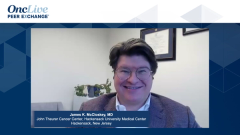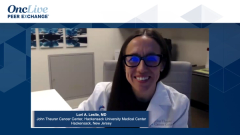
CAR T-Cell Therapy: Managing Adverse Events and Assessing Patient Response in Lymphoma
Clinical insights on managing adverse events associated with CAR T-cell therapy and measuring patient response, highlighting a phase 2 trial on prophylactic anakinra.
Episodes in this series

This is a synopsis of a Peer Exchange series featuring James K. McCloskey, MD, and Lori A. Leslie, MD, of John Theurer Cancer Center, Hackensack University Medical Center.
Dr. Lori Leslie, Associate Professor of Medicine and Director of Indolent Lymphoma and CLL Research Programs at the John Theurer Cancer Center, provides an overview of managing adverse events with CAR T-cell therapy and considerations for response assessments. The two major acute toxicities are cytokine release syndrome (CRS) and immune effector cell-associated neurotoxicity syndrome (ICANS). For CRS, management escalates from supportive care to tocilizumab and finally corticosteroids for more severe or prolonged cases. ICANS is treated with prophylactic anti-epileptics if not started previously and corticosteroids.
Studies are also optimizing prevention strategies, like earlier intervention thresholds for tocilizumab/steroids without efficacy impacts. One ASH 2022 abstract that Dr. Leslie’s center participated in utilized prophylactic anakinra (an IL-1 receptor antagonist) in lymphoma patients receiving commercial CAR T products to reduce severe neurotoxicity rates. Only 10% experienced severe ICANS, all grade 3, and 30% had any grade ICANS overall, favorable compared to historical benchmarks. Thus, preventative measures like anakinra enable safer CAR T delivery in more patients.
Regarding response assessments, baseline imaging is obtained just before infusion, with the first post-treatment scan at 1 month to ensure no aggressive progression. However, more definitive assessments occur around 3 months, with additional imaging at 6, 9, and 12 months that first year. Diffuse large B-cell lymphoma patients achieving complete response by 6 months portends favorable prognosis. Durations for assessing efficacy differ slightly for indolent lymphomas versus aggressive diseases. Other important monitoring includes blood count recovery, hypergammaglobulinemia, infections, and post-CAR T vaccine titers to guide further boosters if deficiencies are uncovered impacting immunity.
*Video synopsis is AI-generated and reviewed by OncLive editorial staff.






































